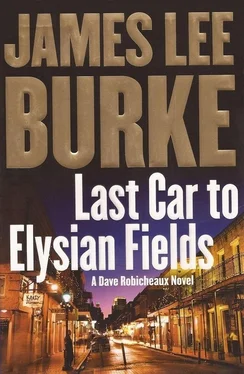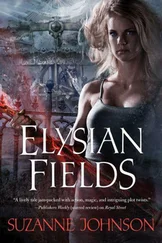“No, sir, I can’t say I do,” he said. He wore khakis and a starched, print shirt, the short sleeves folded in neat cuffs on his upper arms.
His hair was black, combed back with gel, boxed on the neck, his skin tanned.
“Can’t or won’t?” I said, and smiled at him.
“Sir?” he said, confused.
I turned to another marked page in the yearbook and showed him a picture of Lori Parks.
“How about this girl?” I said.
He shook his head, his eyes flat. “No, sir. Don’t know her. I guess I’m not much help on this. These girls do something wrong?”
“You seem out of breath. You all right?” I said.
“I’m fine,” he said, and tried to smile.
“What time did you serve her?” I asked.
“Serve who?”
“Lori Parks,” I said, tapping the picture of the driver.
“I haven’t said I did that. I haven’t said no such thing. No, sir.”
“The autopsy on this girl indicates she was alive when the gasoline tank on her car exploded. She was seventeen years old. I think you’re in a world of shit, partner.”
He swallowed and looked at the smoke hanging in the trees from a barbecue joint. He opened his mouth to speak, but a middle-aged, balding man who wore a cowboy vest and a string tie and hillbilly sideburns that looked like grease pencil cupped his hand on the boy’s shoulder and glared at me through the service window.
“You saying we served somebody under age?” he asked.
“I know you did,” I said.
“Every young person who comes by this window has to show ID. That’s the rule. No exceptions,” he said.
“You the owner?” I said.
He ignored my question and addressed his clerk. “You serve anybody who looked like a minor yesterday?”
“No, sir, not me. I checked everybody,” the clerk said.
“That’s what I thought,” the man in the vest said. “We’re closed.”
“How did you know the problem sale was yesterday?” I asked.
He pulled out the support stick from under the window flap and let it slam shut in my face.
While I had spent the afternoon questioning the employees of New Iberia’s drive-by daiquiri stores, an unusual man was completing his journey on the Sunset Limited from Miami into New Orleans. He had small ears that were tight against his scalp, narrow shoulders, white skin, lips that were the color of raw liver, and emerald green eyes that possessed the rare quality of seeming infinitely interested in what other people were saying. He sat in the lounge car, wearing a seersucker suit and pink dress shirt with a plum-colored tie and ruby stick pin, sipping from a glass of soda and ice and lime slices while the countryside rolled by. An elderly Catholic nun in a black habit sat down next to him and opened a book and began reading from it. She soon became conscious that the man was watching her.
“Could I help you with something?” she asked.
“You’re reading The Catholic Imagination by Father Andrew Greeley. A fine book it is,” the man said.
“I just started it. But, yes, it seems to be. Are you from Ireland?”
He considered his reply. “Umm, not anymore,” he said. “Are you going to New Orleans, Sister?”
“Yes, I live there. But my parents came from Waterford, in the south of Ireland.”
But he didn’t seem to take note of her parents’ origins. His eyes were so green, his stare so invasive, she found herself averting his gaze.
“Would you be knowing a Father James Dolan in New Orleans?” the man asked.
“Why, yes, he’s a friend of mine.”
“I understand he’s a lovely man. Works in a parish where they still say a traditional Mass, does he?”
“Yes, but he’s “
“He’s what?”
“He’s not a traditional man. Excuse me, but you’re staring at me.”
“I am? Oh, I beg your pardon, Sister. But you remind me of a mother superior who ran the orphanage where I once lived. What a darling’ sack of potatoes she was. She used to make me fold my hands like I was about to pray, then whack the shite out of me with a ruler. She was good at pulling hair and giving us the Indian burn, too. Have you done the same to a few tykes?”
He drank from his glass of ice and soda and lime, an innocuous light in his eyes. “Not running off, are you? You forgot your book. Here, I’ll bring it to you,” he said.
But she rushed through the vestibule into the next car, the big wood beads of her fifteen-decade rosary clattering on her hip, the whoosh of the doors like wind howling in a tunnel.
On Saturday afternoon Father Jimmie and I went together to the Flannigan lawn party at Fox Run, down Bayou Teche, in St. Mary Parish.
The home had been constructed during the early Victorian era to resemble a steamboat, with porches shaped like the fantail and captain’s bridge on a ship and cupolas and balconies on the upper stories that gave a spectacular view of the grounds, the antebellum homes on the opposite side of the bayou, and the sugarcane fields that seemed to recede over the rim of the earth.
Live oaks draped with moss arched over the roof of the house, and palm trees grew in their shade to the second-story windows. A visitor to the lawn party could ride either western or English saddle around a white-fenced track by the horse stables, or play tennis on either a grass or red-clay court. The buffet tables groaned with food that had been prepared at Galatoire’s and Antoine’s in New Orleans. The drink table was a drunkard’s dream.
The guests included the state insurance commissioner, who was under a federal grand jury indictment and would later become the third state insurance commissioner in a row to go to prison; petrochemical executives from Oklahoma and Texas whose wives’ voices rose above all others; two New York book editors and a film director from Home Box Office; an ex-player from the National Football League who rented himself out as a professional celebrity; career military officers and their wives who had retired to the Sunbelt; the former governor’s mistress whose evening gown looked like pink champagne poured on her skin; and state legislators who had once been barbers and plumbers and who genuinely believed they shared a common bond with their host and his friends.
Father Jimmie had worn his Roman collar, and the consequence was that he and I stood like an island in the middle of the lawn party while people swirled around us, deferential and polite, touching us affectionately if need be but avoiding the eye contact that would take them away from all the rewards a gathering at Castille LeJeune’s could offer.
After a half hour I wished I had not come. I went inside the house to use the bathroom, but someone was already inside. A black drink waiter in the kitchen directed me to another bathroom, deeper in the house, one I had to find by cutting through a small library and den filled with fine guns and Korean War-era memorabilia.
A steel airplane propeller was mounted on the wall, and under it was a framed color photograph of Castille LeJeune and a famous American baseball player, both of them dressed in Marine Corps tropicals, standing in front of two vintage Grumman Hellcat fighter planes parked on a runway flanged by Quonset huts and palm trees. In another photo LeJeune stood at attention in his dress uniform while President Harry Truman pinned the Distinguished Flying Cross on his coat.
But the photos that caught my eye were not those of Castille LeJeune’s career as a Marine Corps pilot. A picture taken at his wedding showed him and his young wife, in her bridal gown, standing on the steps of a church. She was tall, dark featured, and absolutely beautiful. She also looked like the twin of her daughter, Theodosha.
When I went back outside the sun was setting beyond the trees on the bayou, the sugarcane fields purple in the dusk, the air cool and damp, thick with cigarette smoke and smelling of alcohol that had soaked into tablecloths or had been spilled by the guests on their clothes.
Читать дальше












